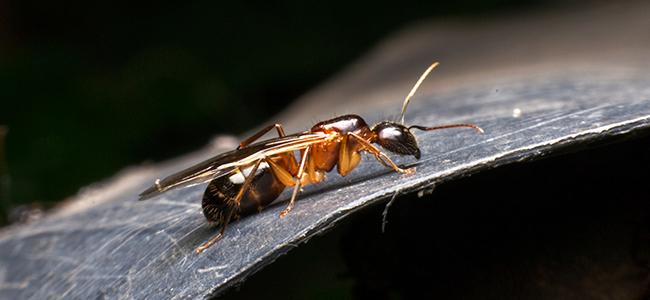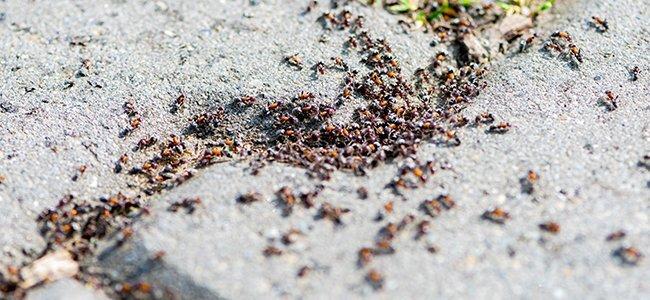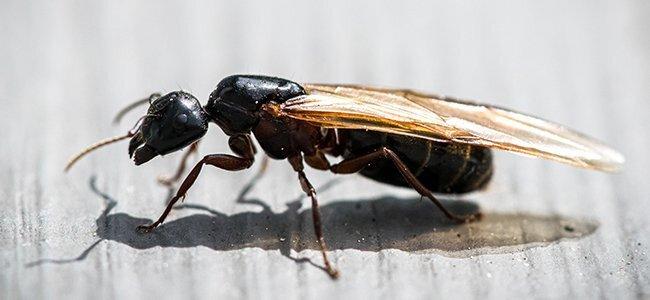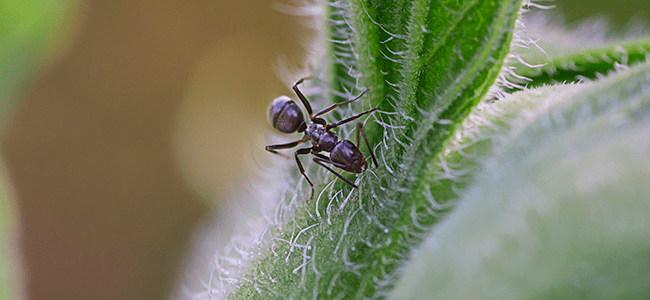
Washington D.C.'s Complete Guide To Odorous House Ant Control
09/03/2021
If ants are making their way around your Washington D.C. home, they can bring a variety of problems to you and your family. However, if it’s ...
READ MORE >

Here in Virginia, ants are a normal part of our summers. As soon as the weather begins to warm up, we start to see these tiny insects crawling around outside. They can be a welcome sight, especially if the winter was unseasonably long or cold. In many cases, the first sighting of ants is one of the first signs of spring and summer, and who doesn’t love to spot the signs that signal long days and warm nights ahead?
On the other hand, when ants become active again, it’s not always a good thing. Pavement ants may primarily remain in outdoor locations, but whether they stay outside on your Virginia property or find their way inside your home, they can become a problem. If you are finding more pavement ants on your property than you want to, you need to know the trick to effective pavement ant control for Virginia homeowners.
Pavement ants are one of the three most common ants found in and around Virginia homes. More than likely, they are the species of ants that your mind automatically defaults to when you think about ants.
Pavement ants are the small black or brown ants that you commonly find walking around on your driveway outside. They are typically around an eighth of an inch in length, although the queens can be a bit bigger, topping out at just under half an inch. Like all insects, pavement ants have six legs. Their bodies are segmented into three sections made up of the head, thorax, and abdomen. They have two antennae that elbow in the middle. Their exoskeleton is hard and waterproof for protection.
Unlike some other ants that have more specific tastes, pavement ants will eat almost anything. This includes commonly known ant foods, like honeydew and fruits, but also includes less popular options, such as meats, cheeses, seeds, other insects, and even bread. They forage for their food, traveling distances of up to 30 feet to look for a meal. When they find a good food source, they’ll create a trail to it so that they can return again and again and so that other ants in their colony can also find the food source.
When outdoors like they should be, pavement ants usually nest in pavement cracks, under rocks, or next to buildings. You can often identify the entryways to these nests by finding the small mounds of sand or dirt they create above the ground. Pavement ant nests can grow quite large, covering an area up to almost 16 square feet, and can house thousands of ants. If two unrelated colonies have nests that get too close to each other, they will battle for the territory.
If pavement ants get inside, they may choose to only use the indoor location as a source of food. However, they may also end up nesting inside, especially if the home has a stone foundation or a dirt floor. However, they can also nest inside walls and insulation, as well as under floors.
The good news about pavement ants is that they are not known to be dangerous. Unlike pharaoh ants, they are not known to spread any diseases, and unlike carpenter ants, they are not known to cause damage to the houses and buildings they infest. They can sting, but they rarely do. Even if you get stung by a pavement ant, it will only cause mild discomfort.
However, that doesn’t mean that pavement ants are completely harmless. If they forage in your house, they will contaminate your food. Finding ants in your pantry items, inside your cupboards, or on the food left out on your countertops is a sign that you need to throw away the items they’ve made contact with. This process can be time-consuming and frustrating, not to mention a waste of food and money.
If pavement ants decide to nest inside your home, you have a bigger problem on your hands. Although you might not need to worry about them making you sick or damaging your house, a pavement ant infestation is a huge frustration. Not only do they typically nest in areas that are very hard to reach, and thus very hard to eliminate, but their colonies also grow extremely large. No one wants, nor should they have to, deal with tens of thousands of ants living inside their Virginia home.
Even if pavement ants never get into your house, they can still become a nuisance outdoors. Finding ant mounds all over your driveway or along the edges of your walkways can be annoying, especially if you spend a lot of time trying to keep your landscaping looking its best. Furthermore, over time pavement ants may move enough soil around under the ground as they build and grow their nests that it could end up shifting stones or paving bricks that you’ve placed for walkways or patios. Although this isn’t a major issue, it can be annoying to have your work disrupted.
When it comes to pavement ants, keeping them out of your Virginia home in the first place is the best option for avoiding the problems they cause. It’s always easier to avoid the infestation altogether than to have to deal with it after it’s occurred. The following tips can help you keep pavement ants out of your house.
Pavement ants are attracted to moisture. Keep moisture levels low around the outside of your house by:
Eliminating areas of standing water.
Keeping gutters clear so they work properly.
Making sure other drainage systems are working properly.
Checking outdoor spigots and water lines for leaks.
Keep moisture levels low inside your house by:
Checking under sinks, behind appliances, and in the basement for water leaks.
Using fans and dehumidifiers to lower moisture levels in kitchens and bathrooms, as well as any other rooms where humidity is higher than normal.
Pavement ants are also attracted to food. Keep food sources to a minimum outside by:
Not leaving pet food dishes or bird feeders outside.
Thoroughly cleaning up from picnics or barbeques after eating outdoors.
Cleaning up fallen fruit from any fruit trees or bushes on your property.
Keeping outdoor garbage bins tightly closed and stored away from the house.
Keep food sources to a minimum inside your house by:
Not leaving any food out on your counter. Store everything in the refrigerator or in hard-sided, airtight containers.
Checking your pantry and cupboards on a regular basis for any spills or damage to packaging. Clean up any messes you find and store food in airtight containers.
Cleaning up dishes and countertops after each meal or snack.
Sweeping and vacuuming on a regular basis.
Taking out the trash on a regular basis.
Make it difficult for pavement ants to get into your house by:
Cutting back tree branches that touch your house. Pavement ants sometimes use these as bridges to gain access to your house.
Filling in all cracks, crevices, gaps, and other openings you find around the outside of your house. Pavement ants are small and can fit through nearly any sized opening into your house.
Keeping firewood or other items or debris stored away from your house.
Installing door sweeps on exterior doors and make sure there are no gaps around doors or windows into your house.
Sometimes taking preventative measures does the trick, and other times, pavement ants still find a way to get inside. Once they get inside your Virginia home, they can be very difficult to eliminate. There are several reasons for this.
Because of how difficult it can be to get rid of a pavement ant infestation, it’s important to know the trick to effective pavement ant control for your Virginia home. Do-it-yourself methods of control rarely, if ever, work, and more often than not these methods just end up leading to frustration.
Most DIY ant control treatments provide you with a temporary reprieve as they eliminate the ants in your general vicinity, but the problem quickly returns since the colony is still active. Furthermore, in some cases, DIY treatments can be dangerous. If you apply or mix the treatment incorrectly, it can be harmful to you, your family members, or your pets.
The trick to effective pavement ant control is to get the experts to do it for you. At American Pest, we have almost a century of experience treating ant problems in Virginia, Maryland, and Washington D.C. This experience, combined with our continuing education, has given us the knowledge and skills necessary to know how to target your pavement ant problems for the most effective results.
When you choose American Pest for ant control, we don’t treat the symptoms. We take the time to carefully inspect your property and identify the source of the problem. By providing treatments that get at the root of your pavement ant infestation, you can be certain that the infestation will be fully taken care of and won’t return in the days or weeks to come.
Our pavement ant control service is not only designed to eliminate your active ant infestation. It’s also designed to protect your home from future threats. After locating and eliminating nesting sites both inside and outside your home, we’ll treat around the entire perimeter of your house, as well as in other common problem areas, to prevent new ant activity. With on-going services, you’ll have year-round protection to keep your Virginia home ant-free when you get ant control from American Pest. Contact us today for more information or to schedule an inspection.

09/03/2021
If ants are making their way around your Washington D.C. home, they can bring a variety of problems to you and your family. However, if it’s ...
READ MORE >

07/21/2021
When ants go on the march, nothing can stand in their way — not even your D.C. property. There are at least 700 different species of ants r...
READ MORE >

04/30/2021
If you’ve ever had ants get into your house, you know how annoying it can be. There’s no such thing as seeing just one ant in your hous...
READ MORE >

Protect your home and family from nuisance and potentially damaging pests with a Preferred Care home pest control plan. Starting at $49/month

Don't let the bed bugs bite a second longer. Contact American Pest for the most comprehensive bed bug control in the industry. Learn More

Our certified rodent control pros will put an end to your frustration by getting rid of rats and mice inside your home. Learn More

Say goodbye to wood-destroying termites in your home when you contact American Pest for expert termite control. Learn More

Trust American Pest to deliver professional backyard tick control services that are guaranteed to get results. Learn More

Don't spend the warm-weather season indoors, find out how American Pest's professional treatments get rid of mosquitoes. Learn More
Fill out the form and recieve feedback in less than 5 minutes. For immediate service please call.